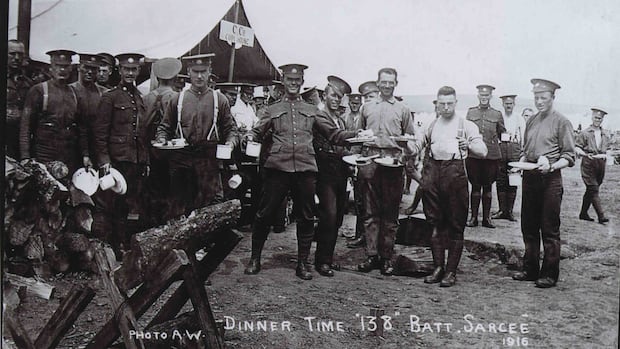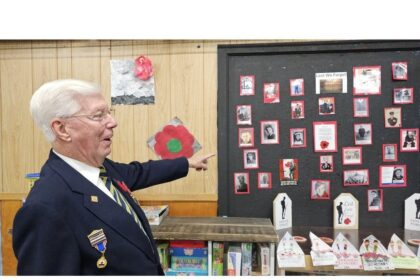LISTEN | Full interview with historian Brandon Marriott:The Current20:25A soldier’s letters gives an inside look at the horrors of the Great WarWhen Lester Harper enlisted in the army at a New Year’s Eve party in the wee hours of Jan. 1, 1916, the farmer from Pouce Coupe, in northern B.C., thought he might be home in time for harvest.“I think he had a bit of a romanticized version of the army in the war,” said historian Brandon Marriott, author of Till We Meet Again, a book based on Harper’s letters home to his wife, Mabel. As a teen, Harper had the time of his life on a trip to Australia with the cadets, says Marriott, plus his brother and cousin were already at the front. “There is this idea of a sense of adventure and possibilities for travel, you see, and maybe even the fear of missing out,” said Marriott. But once Harper arrived in France, Marriott says, he realized it wasn’t anything like what he’d expected. He spoke with Matt Galloway, host of The Current, on Remembrance Day. Here is part of that conversation.You were kind of taken aback a little bit, just not by the fact that the letters even existed, but what he had written in them. Tell me a little bit about why you were surprised by that. Letters from World War I are often brief and impersonal. They acknowledge the receipt of a parcel. The soldiers state that they’re well, and … that they hope that they’ll be home soon. Lester was a lot more open and candid [and] he was also a prolific writer, writing over 600 pages of letters.I think he’s shocked, culturally I mean. He comes from this — you can’t even call it a small town because there are no roads or bridges in northeastern B.C. at the time. He’s a Methodist, and he doesn’t drink and he doesn’t swear and he doesn’t play sports on Sunday. Yet he’s in England [initially], and his friends are having affairs, and a woman swears at him, and he wants to share all this with his wife.Why do you think he wrote in such raw detail?He says at one point, “I’m writing this to you because I see you as part of myself and I want you to experience it.” But, at the same time, when he’s in France, his letters are censored, not only by the army, but of course he self-censors. He wants to protect Mabel from the horrors of war. And he does say at one point where he’s speaking openly about coming under shellfire: “Enough of that. I should not tell you these things.”Brandon Marriott, right, is a Canadian historian currently living in Norway. Pictured at left is his book, Till We Meet Again. (Submitted by Simon & Schuster Canada/Kristoffer Sandven)In writing about the horror of what Lester and so many others went through, the word that you use is “slaughter.” Can you tell me why you landed on that word in particular?Lester talks about feeling like cannon fodder and just the brutality of the war: 16 million people dead, a generation completely wiped out, and just the bodies everywhere. I think it was the imagery that really stuck to me when I was studying this. And you read these accounts … about soldiers commenting that there’s so many dead that they can taste dead men in their tea. Or the fact that they’re just so used to these bodies everywhere that some of them hang their equipment on bones hanging out of the trench walls.It takes your breath away, hearing that. Why is it important for us to hear?Immersing myself in this story really gave me a greater appreciation for the sacrifices of our military personnel, as well as their families, which I think on today, of all days, is something that we should really focus on.Lester wrote to his wife, let the Canadian politicians “come here and make a few trips up the line. Then they will sober up, believe me.” And that actually happens, right? Robert Borden, the Canadian prime minister, makes a visit to the front. What happened then?At the beginning, [Harper is] excited when he first travels across Canada and goes to hear Borden at Parliament in Ottawa. But by the time that he’s been in the trenches for a while, and then when the prime minister comes, he has this skepticism towards it. And I believe he writes later, too, about how they would send these soldiers on these raids to gather intelligence, and it didn’t matter how many soldiers it cost, he said.As you understand it, how common was that sentiment from those who were there right at the sharp edge of this war? I think as the war progressed, I believe one of his words was something about, you know, “patriotism won’t bring me home to you, nor will it protect me from a German shell.” Although, [while] he was there, he believed in fighting for the men at his side.What do you think, psychologically, was the lowest point of Lester’s time fighting?There were a few moments that jumped out at me. When he loses his first soldier, he writes that losing men made his blood boil. And then after about nine months, he kind of has another moment where you see the war is really wearing on him. He’s lost lots of friends and his cousin has gone missing in action, and he thinks he’s dead. And at the same time, he hasn’t heard from his brother in weeks, and he’s worried that he may be dead as well. He’s had numerous close [calls], and he writes that it’s really wearing to never know if you’d be alive again the next morning. He was awarded a medal for his actions during a raid in 1918.Yes, he was sent on this raid, and he was supposed to search these dugouts. And as he’s going through the German lines, he spots the German machine-gun crew setting up in the distance. And this is beyond their objective. So he decides to charge it alone. And at this point he only has his rifle and one smoke grenade and one other grenade. So he’s vastly underarmed compared to this team wielding a German machine gun. And yet he attacks it alone and he kills and he captures the crew.Harper, right, is pictured with his wife, Mabel Harper, after the war. (Submitted by Simon & Schuster Canada)How did he feel, as you understand it, about what he’d been able to do?There’s a lot of humility, even years later.… His daughter finds this [Distinguished Conduct Medal] that’s been buried up in the attic, and he says, “Oh, that’s not a big deal. They gave lots of those away.”His reluctance to speak about what he had gone through is not uncommon…. Doesn’t one of his daughters ask him a question about fighting in the war?Yes. Barbara comes home from school after Armistice Day, and she asks him, “Daddy, did you ever kill a German?” And he was reading his Maclean’s magazine, and apparently he just stared through it. And before Barbara could ask anything else, her mom took her out into the yard and kind of chastised her and said, you know, your father had nightmares for years, so we don’t talk about that.How do you understand that?One of the lessons that I really got out of writing this book was really the importance of taking care of our veterans and these longer-term implications of military service. Lester writes, at one point, “some come back wounded, but few come back alright.”
This WW I soldier was unusually candid about front-line horrors in letters home to B.C.











